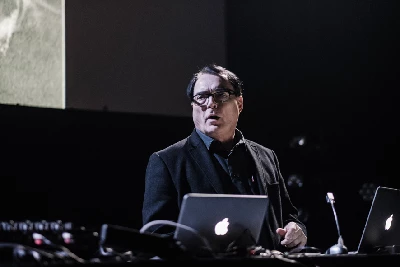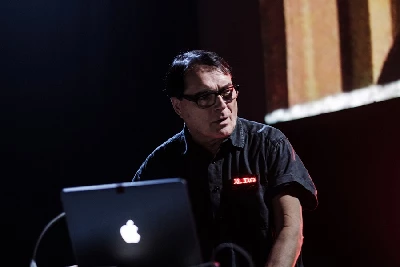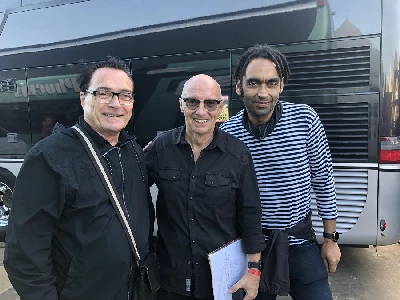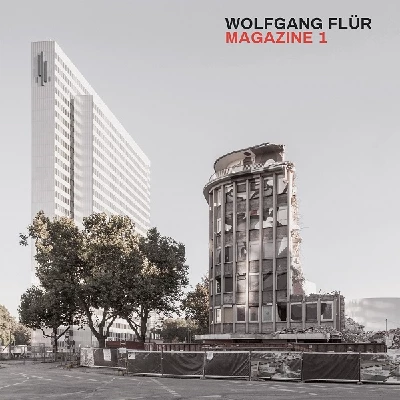published: 23 /
5 /
2022
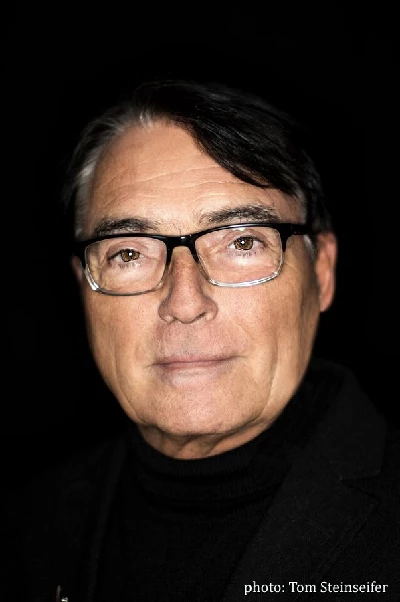
Former member and percussionist of electronic legends Kraftwerk, Wolfgang Flür is set to release his new LP ‘Magazine 1’. Andrew Twambley chatted with him about the making of the album and how its impressive list of collaborators came about.
Article
John Lennon famously said that The Beatles were “bigger than Jesus.” Well, I say that Kraftwerk were more influential than The Beatles! They invented electronica and techno and brought their unique style and sound to the world with mainstream chart hits like ‘Autobahn’ and ‘The Model’ and with classic albums such as ‘Trans Europe Express’, ‘The Man Machine’ and ‘Computer World’. Without their creative brilliance, we would have no New Order, no Gary Numan, no OMD, no Ultravox, no hip-hop and no drum and bass, the list is endless.
Although Kraftwerk are still touring,. classic 70s line-up percussionist Wolfgang Flür left the band in 1987 but has never sat back and relaxed, having released a series of solo albums and been involved in numerous collaborations. His latest album ‘Magazine 1’ will be released followed by an extensive tour. We were presented with the opportunity to speak with him, which we were never about to turn down.
PB: Thank you for talking to Pennyblackmusic, Wolfgang, it is an honour and a privilege for me to speak to you. Let’s kick off with the title of the new album, why ‘Magazine 1’, is it related to your role as storyteller?
WF: You can say that. It was an idea from a good friend and partner in Dusseldorf, Marcos Luis who is a very well-known artist. He designed the artwork for the album and accompanying newspaper. We were in a restaurant to celebrate something and were speaking about my new album which I was going to call ‘Collaborators’, because I was recording it with many friends and artists who I know. He said, “That’s not a good name, Wolfgang what is it about?”. I said, “Because I do so many things with others with different themes, like a magazine. Every page is another story”. He said, “Then call it ‘Magazine’, that’s a much better title for it".
PB: That’s a great photo on the front, showing one old and one new building next to each other in harmony. It it one photo or a composite?
WF: It’s one photo of a scene in Dusseldorf taken by Marcos, I saw it at an exhibition that he held and said, “I must reserve that for my album cover”. He said “Why?” and I told that that I was thinking about collaborations and these two buildings were collaborating with each other. The old and new, so different in style, they had a magic to me. At first sight I asked myself, “What could they do together?” You see, I sometimes work with artists who before, I could not think how we could work together. This is the symbolism of this picture, two different things that go perfectly together.
PB: What makes you want to go back into the studio, I mean, you have been there and done that in a career spanning over 50 years?
WF: I’ve been producing my music since 1997 with my first album after Kraftwerk. It was only ten years away from music, but my first album was different in that I had developed a storyteller in me, because I discovered this talent when I was solo. I had never done anything with my voice, not singing, not talking, just drumming. Thank God that I found this talent, which had been hidden from me, I now have a new direction.
PB: Your PR sent me a copy of the album a couple of weeks ago and I’ve been devouring it ever since. ‘Billionaire’ is like a spoken word / acting piece. Are you playing a role in your magazine?
WF: It’s the main roll, I am the billionaire well, the guy who I am talking about is! I always wanted to be an actor in my youth as I said in my autobiography “I Am Robot”. I never made it as such but at least I became an actor in my songs. I go on stage and act out my songs and play a role. I lend this guy my voice.
PB: ‘Electric Sheep’ is a collab with Carl Cox techno producer/superstar DJ. How did Carl become involved and what does he bring to your music?
WF: I did not meet him personally, his manager organised it. He came in contact with me and wanted to book me for a show in 2019 when we had no idea about Covid. He wanted to organise a big show at The Printworks in London together with William Orbit. We spoke many times about it then suddenly it was cancelled when Covid came. We stayed in contact and his manager sent me an email saying that he had been talking with Carl. He said, “Carl is a big fan of your former music and wants to collaborate in some way”, I said “Why not?” Collaborating is a big thing for me and it is the basis of ‘Magazine 1’. Sometimes I have ideas or inspirations that touch the soul of my heart, so I write a story on my computer and at that moment I have the melody. I sent this to Carl and we made “Electric Sheep”
PB: I think my favourite track is ‘Birmingham’, it isn’t exactly a glamorous city, so why there?
WF: Really, I like Birmingham very much. My music partner since 2015, Peter Duggal, he is like my brother and he is born in Birmingham. So many people there are from India and Pakistan, it is the most mixed culture city I have ever seen, even more than London. I like London but Birmingham is more familiar to me. Peter has a very large family there and I go there many times so I learned a lot about the place.
PB: ‘Birmingham’ features legendary bass player Peter Hook, who coincidentally lives 4 kilometres from me. Tell me about that collaboration.
WF: I am so proud that he plays on my album. He is friends with Peter Duggal who asked me, “Shall I ask Peter Hook to collaborate. I know him very well and he has interests similar to yours?” I said, “Yes of course, I am an open door and I could play with anyone who likes good rhythm”. I asked him to send me a song and he sent this wonderful bassline. You can really hear his special high bass, which is his speciality. Many people who have listened to the track asked me if Peter Hook was playing the bass, he’s very distinctive.
PB: ‘Night Drive’ to me, has a very 80s feel with a 21st century edge. One of several tracks with superb female vocals. What is the origin of that track?
WF: It is a production by Peter Duggal. It’s a most unusual track which took much input over a very long time. I did not know what was going on with the track until I finished it. Something really touched me about it. It is my story about driving in the night, although I am very rarely awake at 4 am, like in the song, it was probably more like 1 or 2am! I wanted to include the sound of the night road, like in ‘Autobahn’. There are so many crazy sounds on that track. This is one of my specialities, I like to go back through the song in a completely different direction. Music is too boring if you only keep repeating the verse and the chorus line, maybe with a little bridge. That’s not for me. When I play on one level, I tell Peter that we must go to a completely new level. That is how I make my music.
PB: I’m hearing whispers of ‘Magazine 2’ in the pipeline, is that right?
WF: Yes, the crazy thing is that Peter and I have worked together for five years but I also work with some friends of mine from Hamburg. When I was playing them some of my music, they said “Wolfgang, this sounds a little like film music. Would you let me make some pop music out of it?” So he did and I listened and I thought it was more than just techno, it was intelligent techno. So we made some music which did not fit on ‘Magazine 1’. We made about five tracks together and three of those will be on ‘Magazine 2’. The new album is seventy-five percent done.
PB: When I was researching this piece, I dug right back to the 1960s and came across you in a band called The Spirits of Sound with Michael Rother. I saw an extraordinary video with you on a large trolley being pulled through a shopping precinct playing music looking ill at ease! What was the concept behind that?
WF: Yes, that was a crazy thing! It was The Teenage Fair, celebrating youth in Germany. It was only celebrated once but it ran really well. There were so many projects around teenagers. They engaged us because we were pretty well known in Dusseldorf. They pulled us around on that little train. There was me on the drums and there was also a Hammond organ and Michael Rother on guitar. We were driving around the whole day, that was our job. You know we were young and we needed the money and they paid us well. I had very long bushy black hair then and I remember being in the changing room smoking a cigarette and the girl singer shouted at me, “Oh Wolfgang, do you have to smoke so much, it will ruin my voice?” I do not know why I remember that!
PB: I also came across a video of Tanzmusic with you playing an “egg box covered in tin foil”. I assume that was the start of something big?
WF: That machine came from both Florian (Schneider) and me. It was a very famous German culture programme that is still shown to this day. It was, I think October 1973 and we were engaged for three songs but nothing was planned. It was in a big hall and all that was there was a little drum set for children, which was “Kaput” as we Germans say. We were looking around and then I saw a little transistorised rhythm box, which I connected to the big amplifier and the bass drum sound made me flabbergasted! It was the best bass drum sound I had ever heard. It was a dry sound and the tom toms were not that good so I played around with various buttons, covered it in foil, and we had a new sound.
PB: I interviewed Midge Ure about two years ago, I’ve followed his career since the early 70s when I saw him in a small club in Liverpool. I asked him what it was like to be the Grandaddy of synth music and he replied, “You had better ask Florian Schneider and Wolfgang Flür”.
WF: Ha ha, that’s a good thing, he is like a brother to me. When we met it was so funny, he was paying with his band Electronica in Dusseldorf. I went to listen and we had some good talks in the artists room afterwards. I just went to shake his hand. He said, “Oh Wolfgang I love your music. Let’s do something together”, I said “I was going to ask you the same thing”. Anyway, we met again a few months later and again after that when he was supported by Tiny Magnetic Pets who I also know, as I had collaborated with them already. We got together and had a big party and Midge came up to me and said, “I have an idea Wolfgang, are you still up for a collaboration?” “Of course” I said. He responded with ‘Das Beat’. I laughed because he was saying it wrong, but he is so charming and told me he had already recorded a bit of the idea with some lyrics and would send it over to me. It was only small but it was fantastic. So I said “OK, let’s form a duo” and we made ‘Das Beat’ very fast. It was the quickest collaboration I ever did; three weeks and we were done. It is featured on both our albums. Midge is so easy to work with and such a wonderful person. Nothing is complicated with him.
PB: Wolfgang, it has been a great pleasure to speak to you. I will see you in Liverpool in April. Look out for me!
WF: I will, it’s been nice, Bye Bye
‘Magazine 1’ is available through Cherry Red Records on March 4th
Wolfgang Flür UK Tour Dates:
Mar 4, Bristol, Motion & The Marble Factory
Mar 12, Norwich, Epic Studios
Apr 8, Halifax, Square Chapel Centre For The Arts
Apr 16, Liverpool, Camp & Furnace
Apr 22, Stockton-on-Tees, The Georgian Theatre
Jun 9, Leeds, The Warehouse
Jun 11, Cardiff, The Globe
Oct 1, Brighton, Concorde 2
Band Links:-
http://www.musiksoldat.de
https://www.facebook.com/musiksoldat/
https://twitter.com/iwasarobot
https://www.facebook.com/Wolfgang-Fl%C
Play in YouTube:-
Picture Gallery:-
